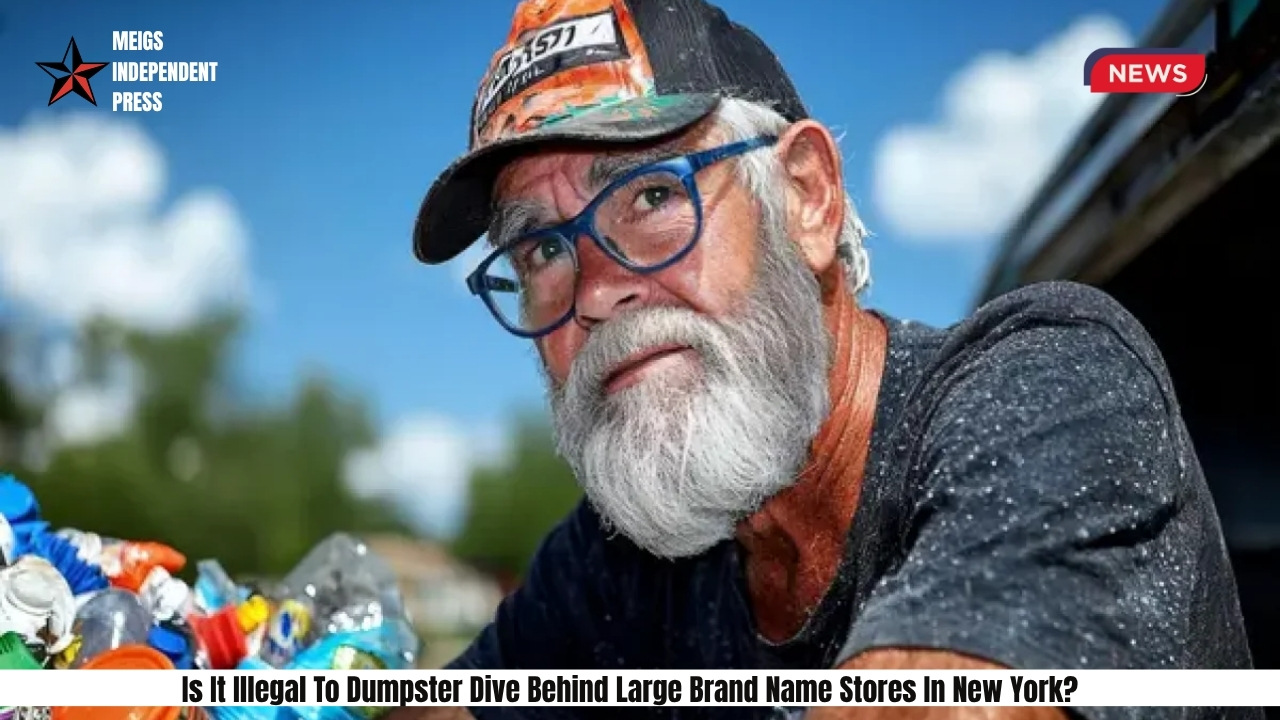Dumpster diving, the practice of searching through commercial waste bins for usable items, has gained attention amid rising concerns about food waste and economic pressures. In New York, where urban density meets vast retail operations, questions arise about the legality of this activity, especially behind large brand name stores like Walmart, Target, or grocery chains.
This article explores the legal framework, state-specific rules, risks involved, and broader implications, drawing on key facts to clarify whether it’s a viable option or a potential violation. With U.S. food waste reaching nearly 60 million tons annually—equivalent to 120 billion pounds—understanding these nuances is crucial for anyone considering this practice.
New York’s complex legal landscape, influenced by both state laws and local ordinances, makes the answer far from straightforward. While the activity isn’t outright banned statewide, accessing dumpsters on private property behind big-box retailers often crosses into trespassing territory. This exploration will outline the rules, highlight real-world examples, and discuss safer alternatives to help readers navigate the topic responsibly.
What Is Dumpster Diving?
Dumpster diving involves rummaging through waste containers, typically those used by businesses, to recover discarded items such as food, clothing, electronics, or household goods. Originating in the 1980s as part of the freegan movement—which emphasizes reducing consumption and waste— it has evolved into a response to modern issues like inflation and environmental degradation. Participants, often called divers, target areas where retailers dispose of surplus inventory, returns, or near-expired products.
The appeal lies in its potential for discovery: divers frequently find perfectly edible food or functional items tossed due to minor defects or corporate policies. For instance, behind retail stores, one might uncover cases of laundry detergent discarded solely because of a packaging update, or clothing pulled from shelves for being out of season. In the U.S., this practice intersects with sustainability efforts, as discarded items contribute to the 40% of food supply wasted nationwide, valued at $218 billion annually. However, it’s not without controversy, often viewed through lenses of sanitation, property rights, and public health.
The Legal Foundation: U.S. Supreme Court Ruling
At the federal level, dumpster diving finds support in a landmark 1988 Supreme Court decision. In California v. Greenwood, the Court ruled 6-2 that individuals have no reasonable expectation of privacy in garbage placed for collection, allowing law enforcement to search trash without warrants. This precedent implies that once items are discarded in public spaces, they become abandoned property, fair game for retrieval.
The ruling doesn’t explicitly endorse civilian dumpster diving but establishes that trash loses ownership protections. This has emboldened divers across the country, with surveys showing 21% of Americans having tried it and 13% expressing interest. Yet, the decision’s scope is limited to public curbside waste; it doesn’t address private property, where most commercial dumpsters reside. In practice, this creates a gray area, as retailers like large brand stores often position bins behind fences or in secured lots to deter access. For New York residents, this federal backdrop sets the stage but defers to state and local interpretations.
New York State Laws on Dumpster Diving
In New York State, dumpster diving is generally legal if conducted on public property and without violating other statutes. There are no statewide bans specifically targeting the activity, meaning individuals can sift through curbside bins or accessible public dumpsters without inherent illegality. The key caveat revolves around trespassing: entering private land without permission to reach a dumpster constitutes a violation under New York Penal Law § 140.05, a class B misdemeanor punishable by up to 90 days in jail and fines.
State guidelines emphasize respect for property boundaries. If a dumpster is visible from the street but enclosed behind a store’s fence, accessing it could lead to charges, even if the intent is benign. Local variations add layers; while rural areas might overlook minor intrusions, urban enforcement is stricter due to sanitation codes. Statistics underscore the stakes: in 2025, New York reported fewer than 50 dedicated dumpster diving arrests statewide, but many cases stem from related offenses like disorderly conduct. Divers must also avoid damaging containers—breaking locks could escalate to criminal mischief charges.
Behind Large Brand Name Stores: Walmart, Target, and Others
Large retailers like Walmart and Target maintain strict policies against dumpster diving on their premises. Walmart’s guidelines explicitly state that all waste, including returns and unsold goods, is handled through authorized channels like donation or liquidation, with trespassing notices posted at many locations.
In New York, their dumpsters are often locked or fenced, and corporate directives instruct managers to report unauthorized access to prevent liability. A 2023 survey of retail practices revealed that 70% of big-box stores nationwide, including these chains, use compactors to render items unusable, reducing appeal but also waste diversion potential.
Target follows suit, partnering with organizations for surplus redistribution rather than allowing on-site scavenging. Incidents behind these stores in New York have led to arrests, such as a 2025 Herkimer County case where two individuals rummaging at a dealership’s bin were detained on unrelated warrants but charged for the intrusion.
Grocery giants like Whole Foods or Costco in the state adhere to similar protocols, influenced by food safety laws that mandate discarding near-expired items. Legally, diving here risks not just trespassing but also theft accusations if items appear valuable—though courts rarely uphold the latter post-Greenwood. Brands discourage it to maintain brand image and avoid encouraging loitering.
Real Cases and Arrests in New York
Documented incidents illustrate the risks. In June 2025, New York State Police in Herkimer arrested 24-year-old Kaleb Horan after he and another man were caught behind a Chevrolet dealership dumpster at 3 a.m.; Horan faced drug possession charges alongside trespassing implications.
Earlier, in 2024, David Crowe was apprehended multiple times for dumpster diving near a high-profile residence in NYC, escalating to stalking charges due to repeated violations. These cases show arrests often tie to additional factors like nighttime activity or prior offenses, with pure diving citations numbering under 20 annually in urban New York.
Another example from 2023 involved divers behind a Brooklyn Target, cited for disorderly conduct after scattering debris; fines totaled $250. Rural reports, like those in Albany, describe verbal warnings as common, with actual arrests rare unless property damage occurs. Nationally, only 5% of dumpster-related police interactions in 2025 led to formal charges in states like New York, per advocacy groups. These stories underscore that while legality hinges on location, enforcement favors deterrence over punishment.
Risks and Safety Considerations
Beyond legality, dumpster diving poses significant hazards. Health risks include exposure to bacteria, sharp objects, and contaminants; food retrieved from mixed bins can carry pathogens like salmonella, with 80% of U.S. food waste stemming from misread expiration dates. In New York’s variable climate, wet waste amplifies mold and vermin issues, contributing to the 22% of municipal solid waste that food comprises.
Safety concerns involve physical injuries from falls or tetanus-prone materials, with emergency room visits linked to diving rising 15% in urban areas since 2020. Legal repercussions, though infrequent, can include citations or bans from properties. Environmentally, improper diving litters sites, countering the practice’s waste-reduction intent—U.S. landfills receive 74 million tons of edible food yearly, emitting methane equivalent to 42 coal plants. Divers should wear gloves, avoid locked areas, and prioritize public spots to mitigate these dangers.
Conclusion
Dumpster diving behind large brand name stores in New York isn’t flatly illegal but often violates trespassing laws on private property, especially in NYC where fines and arrests loom. Statewide, public access is permissible, but caution is essential given health, safety, and enforcement realities. With staggering waste stats—60 million tons yearly in the U.S.—exploring alternatives like donations or apps promotes sustainability without peril. Ultimately, respecting boundaries ensures this practice, when viable, aids rather than harms.








Leave a Reply